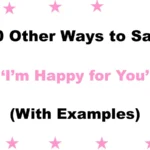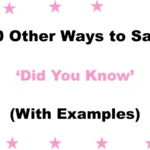Finding the right words to express that someone left the company can be more meaningful than a simple statement. Whether you’re writing a farewell email, updating a team, or sharing news with clients, choosing thoughtful language can make your message feel warmer and more personal.
Saying goodbye with care reflects respect for the individual’s contributions and helps maintain positive relationships. In this article, you’ll discover 30 empathetic and professional alternatives to say “someone left the company” along with examples, so you can communicate with confidence and kindness.
What Does “Someone Left the Company” Mean?
This phrase simply means that an employee or team member is no longer working at the organization. It can happen for many reasons—resignation, retirement, contract completion, or termination. While the phrase itself is straightforward, how you say it can impact the tone of your message and the feelings of those involved.
When to Use “Someone Left the Company”
You might use this phrase or its alternatives when:
- Announcing departures to colleagues or clients
- Writing exit interviews or farewell notes
- Updating organizational charts or directories
- Managing team transitions
The context determines whether a more formal, casual, or empathetic tone is appropriate.
Is It Professional/Polite to Say “Someone Left the Company”?
Yes, it is professional and polite, but it can sound neutral or distant. To show care and respect, many prefer softer or more positive phrases that highlight the individual’s journey, contributions, or new opportunities rather than focusing solely on their departure.
Pros and Cons of Saying “Someone Left the Company”
Pros:
- Clear and straightforward
- Neutral tone suits formal contexts
- Easy to understand
Cons:
- Can feel impersonal or cold
- Might overlook emotional impact
- Doesn’t convey reasons or appreciation
Synonyms for “Someone Left the Company”
- Transitioned out of the company
- Moved on from the organization
- Ended their tenure
- Departed the team
- Pursued new opportunities
- Concluded their role
- Stepped down from their position
- Resigned from their post
- Retired from the company
- Completed their contract
- Took on a new challenge
- Shifted to another venture
- Wrapped up their assignment
- Was promoted elsewhere
- Changed career paths
- Bid farewell to the company
- Closed their chapter here
- Exited the organization
- Left to explore other options
- Signed off from their duties
- Was released from their role
- Concluded their service
- Transitioned to a new role outside
- Took a leave of absence (if temporary)
- Was transferred to a different division
- Moved into a different industry
- Voluntarily stepped away
- Was laid off due to restructuring
- Pursued personal goals outside work
- Concluded their professional journey here
1. Transitioned out of the company
Definition: A gentle way to say someone has moved on from their role.
Explanation: Suggests a smooth, planned change rather than abrupt departure.
Example: “After five years of dedicated work, Jane transitioned out of the company to focus on new projects.”
Best Use: Formal emails or announcements emphasizing a respectful change.
Worst Use: Situations where the departure was sudden or involuntary.
Tone: Warm, professional, and positive.
2. Moved on from the organization
Definition: Indicates the person left to pursue something different.
Explanation: Highlights forward momentum rather than loss.
Example: “Mark has moved on from the organization to explore new career opportunities.”
Best Use: When the departure is voluntary and positive.
Worst Use: When the person was terminated or left under negative circumstances.
Tone: Optimistic and respectful.
3. Ended their tenure
Definition: Refers to the completion of a person’s time at the company.
Explanation: Neutral, focusing on the duration rather than reason.
Example: “Sara ended her tenure with us after three successful years.”
Best Use: Formal or neutral announcements.
Worst Use: When wanting to emphasize personal feelings or contributions.
Tone: Formal and factual.
4. Departed the team
Definition: A direct way to say someone left the group or department.
Explanation: Simple and clear, suitable for team communications.
Example: “Alex departed the team last month to pursue a different path.”
Best Use: Internal communications.
Worst Use: Formal public announcements where a softer tone is needed.
Tone: Clear and concise.
5. Pursued new opportunities
Definition: Suggests the person left to explore different options.
Explanation: Positive and forward-looking phrase.
Example: “Emily left the company to pursue new opportunities in her field.”
Best Use: When departure is voluntary and career-driven.
Worst Use: When the exit was forced or involuntary.
Tone: Encouraging and professional.
6. Concluded their role
Definition: Indicates the person has finished their position or responsibilities.
Explanation: Neutral, focuses on role completion rather than departure reason.
Example: “John concluded his role as project manager last quarter.”
Best Use: Formal settings or when wrapping up a project-based role.
Worst Use: When wanting to emphasize personal connection or appreciation.
Tone: Formal and neutral.
7. Stepped down from their position
Definition: The person voluntarily gave up their role.
Explanation: Implies a respectful transition, often from leadership.
Example: “Linda stepped down from her position as director to focus on personal goals.”
Best Use: Leadership changes or voluntary resignations.
Worst Use: When the exit was forced or unexpected.
Tone: Respectful and formal.
8. Resigned from their post
Definition: Officially left the position voluntarily.
Explanation: Formal phrase indicating a personal decision to leave.
Example: “Tom resigned from his post last month to pursue further education.”
Best Use: Formal announcements and HR communications.
Worst Use: Informal or casual conversations.
Tone: Formal and factual.
9. Retired from the company
Definition: Ended work due to reaching retirement age or personal choice.
Explanation: Shows completion of a long-term career.
Example: “After 30 years of service, Carol retired from the company.”
Best Use: For senior employees ending their careers.
Worst Use: For non-retirement exits.
Tone: Respectful and celebratory.
10. Completed their contract
Definition: Finished a set employment period or project.
Explanation: Neutral, highlights contract terms.
Example: “Miguel completed his contract as a consultant last week.”
Best Use: Temporary or contract roles.
Worst Use: Permanent employee departures.
Tone: Neutral and factual.
11. Took on a new challenge
Definition: Left to try something new and exciting.
Explanation: Positive, focusing on growth.
Example: “Sophia took on a new challenge outside the company to expand her skills.”
Best Use: Voluntary, career-driven departures.
Worst Use: Involuntary exits.
Tone: Optimistic and encouraging.
12. Shifted to another venture
Definition: Moved on to a different business or project.
Explanation: Indicates a change in professional focus.
Example: “After five years, David shifted to another venture in the tech industry.”
Best Use: Entrepreneurial or career changes.
Worst Use: Sudden or forced departures.
Tone: Positive and professional.
13. Wrapped up their assignment
Definition: Finished a specific job or project within the company.
Explanation: Neutral, project-focused phrase.
Example: “Jessica wrapped up her assignment and is moving on to new opportunities.”
Best Use: Temporary or project-based roles.
Worst Use: Long-term employment exists.
Tone: Neutral and professional.
14. Was promoted elsewhere
Definition: Left because of advancement in a different company or department.
Explanation: Shows career growth beyond the current role.
Example: “Carlos was promoted elsewhere and is no longer with us.”
Best Use: Positive career moves.
Worst Use: When promotion is unclear or internal.
Tone: Respectful and positive.
15. Changed career paths
Definition: Shifted focus to a different profession or industry.
Explanation: Indicates a deliberate professional change.
Example: “After ten years, Rachel changed career paths and left the company.”
Best Use: Career transitions.
Worst Use: Temporary absences or lateral moves.
Tone: Thoughtful and respectful.
16. Bid farewell to the company
Definition: Said goodbye to the organization.
Explanation: Warm and personal way to express departure.
Example: “Michael bid farewell to the company with a heartfelt speech.”
Best Use: Farewell events or emails.
Worst Use: Impersonal notices.
Tone: Warm and sincere.
17. Closed their chapter here
Definition: Finished their journey with the company.
Explanation: Reflects a personal and meaningful ending.
Example: “Anna closed her chapter here after a rewarding career.”
Best Use: Emotional or reflective communications.
Worst Use: Casual or brief announcements.
Tone: Thoughtful and nostalgic.
18. Exited the organization
Definition: Formal way to say someone left.
Explanation: Neutral and professional.
Example: “Peter exited the organization last month.”
Best Use: Formal HR or business communications.
Worst Use: Informal settings.
Tone: Formal and straightforward.
19. Left to explore other options
Definition: Departed to find new opportunities.
Explanation: Positive and open-ended.
Example: “Nina left to explore other options in her career.”
Best Use: Voluntary, forward-looking departures.
Worst Use: When departure reason is unclear.
Tone: Positive and optimistic.
20. Signed off from their duties
Definition: Officially ended responsibilities.
Explanation: Formal, emphasizes task completion.
Example: “George signed off from his duties last Friday.”
Best Use: Project or role completions.
Worst Use: Emotional farewells.
Tone: Formal and neutral.
21. Was released from their role
Definition: Left due to a company decision.
Explanation: Indicates involuntary departure.
Example: “Due to restructuring, Lisa was released from her role.”
Best Use: When explaining layoffs.
Worst Use: Voluntary resignations.
Tone: Sensitive and factual.
22. Concluded their service
Definition: Ended employment period.
Explanation: Formal and respectful phrase.
Example: “Raj concluded his service after 15 years.”
Best Use: Long-term employees and retirements.
Worst Use: Short-term roles.
Tone: Formal and respectful.
23. Transitioned to a new role outside
Definition: Moved on to a different job elsewhere.
Explanation: Shows career movement beyond the current company.
Example: “Emily transitioned to a new role outside the company last month.”
Best Use: Voluntary job changes.
Worst Use: Internal transfers.
Tone: Professional and positive.
24. Took a leave of absence (if temporary)
Definition: Temporarily stepped away from work.
Explanation: Implies return is possible.
Example: “James took a leave of absence to care for family.”
Best Use: Temporary breaks.
Worst Use: Permanent departures.
Tone: Compassionate and neutral.
25. Was transferred to a different division
Definition: Moved internally within the company.
Explanation: Not a departure, but a role change.
Example: “Sophia was transferred to a different division last week.”
Best Use: Internal announcements.
Worst Use: When talking about leaving the company.
Tone: Informative and positive.
26. Moved into a different industry
Definition: Left to work in another sector.
Explanation: Highlights career shift beyond company.
Example: “Mark moved into a different industry after leaving the company.”
Best Use: Career change announcements.
Worst Use: Temporary or internal moves.
Tone: Positive and forward-looking.
27. Voluntarily stepped away
Definition: Left by personal choice.
Explanation: Emphasizes autonomy.
Example: “Julia voluntarily stepped away to focus on personal growth.”
Best Use: Voluntary resignations.
Worst Use: Forced departures.
Tone: Respectful and warm.
28. Was laid off due to restructuring
Definition: Involuntary departure due to company changes.
Explanation: Sensitive but clear explanation.
Example: “Due to restructuring, Tom was laid off last month.”
Best Use: Transparency about layoffs.
Worst Use: Voluntary exits.
Tone: Compassionate and factual.
29. Pursued personal goals outside work
Definition: Left to focus on non-work priorities.
Explanation: Positive and personal focus.
Example: “Anna pursued personal goals outside work after her departure.”
Best Use: When reasons are personal.
Worst Use: Professional or forced exits.
Tone: Warm and understanding.
30. Concluded their professional journey here
Definition: Finished their career at this company.
Explanation: Reflective and respectful phrasing.
Example: “Michael concluded his professional journey here after 20 years.”
Best Use: Retirements or long service.
Worst Use: Short-term roles.
Tone: Respectful and thoughtful.
Conclusion
Expressing that someone left the company doesn’t have to be simple or impersonal. Choosing the right words can convey warmth, respect, and understanding. Whether you want a formal tone or something more heartfelt, the alternatives above provide you with thoughtful ways to communicate departure news that resonates. Always consider the situation, reason, and audience to pick the phrase that best fits your message. Using empathetic language not only shows respect for the individual but also helps maintain positive relationships and a supportive workplace culture.
FAQs
1. What’s the most professional way to say someone left the company?
The most professional alternatives are “They have moved on to new opportunities”, or “They have transitioned out of the organization.” These phrases maintain a neutral, respectful tone while protecting the individual’s privacy.
2. Should I mention the reason someone left the company?
Only if it’s publicly known and appropriate for the audience. If it’s confidential or sensitive (e.g., termination or personal issues), use a general phrase like “They’ve moved on” or “They’re no longer with the company.”
3. Can I use humor or casual language in internal announcements?
It depends on your company culture. While humor can work in close-knit or creative teams, always ensure your tone stays respectful and empathetic, especially in formal settings or when the departure was unexpected or sensitive.
4. Is it okay to send a message about someone leaving via email or Slack?
Yes, but choose your platform based on formality and visibility. For official departures, a company-wide email or formal notice is best. For casual team updates, Slack may be acceptable—just ensure your tone and wording reflect the situation’s gravity.
5. How do I acknowledge someone leaving without causing worry among team members?
Use warm and clear language. Focus on celebrating the person’s contributions and reassuring the team about continuity. For instance: “We appreciate everything [Name] brought to our team, and we wish them all the best in their next chapter.”

Mia Rose is a passionate Language Coach and Contributor at GrammarPeaks, where she specializes in practical grammar tips and language learning strategies. With a strong foundation in education and communication, Mia brings a friendly, approachable style to her writing. Her goal is to make complex grammar rules simple and usable for learners at any level, helping them grow in both confidence and fluency.





